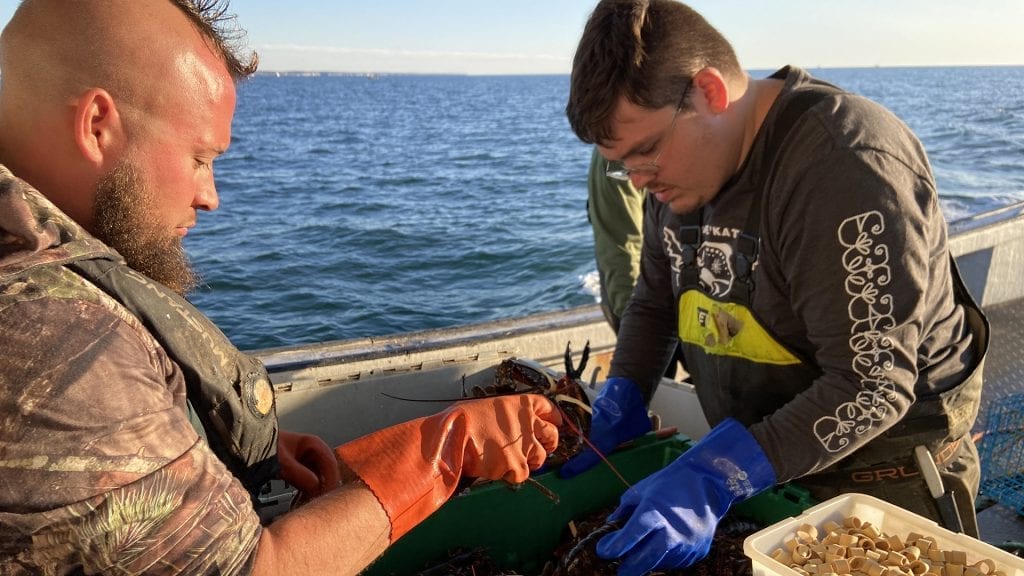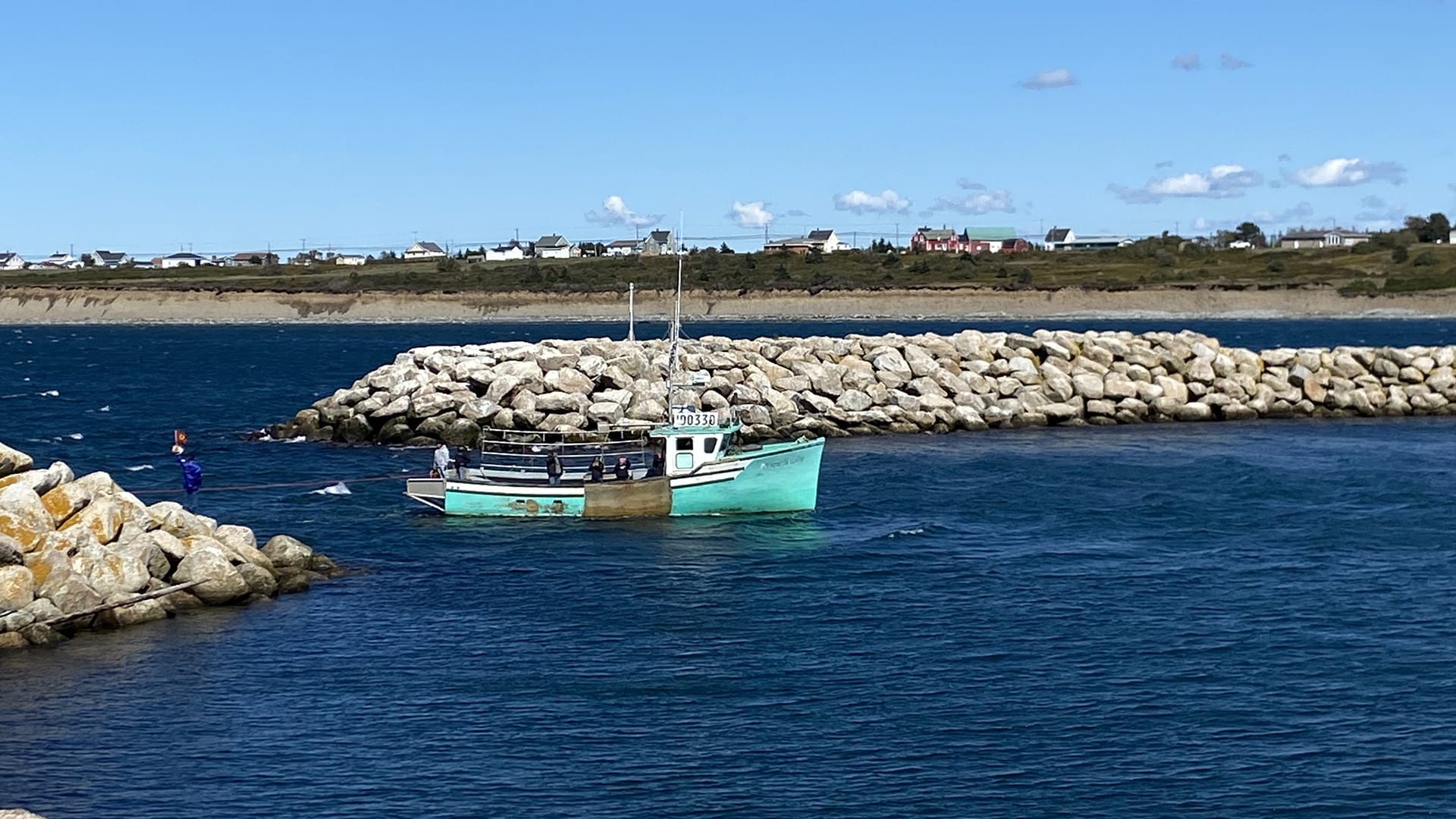
The Mi’kmaq dropped 50 traps, but the buoy lines had been cut. After several attempts, one of the Mi’kmaw crews were able to locate and haul up ten lobster traps, celebrating this success as the first official catch of Sipekne’katik’s livelihood fishery. Photo: Trina Roache/APTN
Sipekne’katik Chief Mike Sack says he’s “deeply troubled” as the band’s fleet incurred more damage overnight as commercial fish harvesters cut the lines to lobster traps set in the Mi’kmaw rights-based fishery.
This happened after Sack spoke with federal fisheries minister Bernadette Jordan Saturday evening to discuss ongoing aggression towards the Mi’kmaq in western Nova Scotia.
“It is so disheartening to have had a progressive meeting with the minister yesterday to reinforce that we are following our moderate livelihood fishery plan and to be repeatedly sabotaged by this criminal conduct,” said Sack in a statement issued Sunday morning.
Sunday afternoon, dozens of non-Indigenous commercial fishing boats continue to surround Mi’kmaw fishers in St. Mary’s Bay, hauling up lobster traps set by the Mi’kmaq.
The Sipekne’katik First Nation launched its moderate livelihood fishery on Thursday in Saulnierville, a three-hour drive west of Halifax. In the days since, there have been confrontations with non-Indigenous fish harvesters on the wharf and on the water.
“Attempts to block our boats from fishing and our people from the wharf and ongoing damage caused to our vessels and equipment are our biggest concern right now and Minister Jordan agreed,” said Sack.
The Mi’kmaq have taken over the wharf in Saulnierville, putting up a blockade on Friday evening, after non-indigenous fishermen drove their trucks to the wharf parking lot, spinning wheels in the gravel.
The checkpoint now in place limits who can access the wharf, in an effort to minimize the threat of violence.
The band intends to set up an operations post at the wharf to keep an eye on gear and vessels.
But the commercial fishing boats maintain a constant presence in St. Mary’s Bay.
APTN News was filming on one of 15 Mi’kmaw lobster boats that sailed into the Saulnierville wharf on Saturday.
Roughly 70 non-Indigenous commercial boats could be seen on the horizon, approaching and then backing off.
Alex McDonald, Mi’kmaw captain of French Lily, said that was a scare tactic, “You never know what they will do; they are unpredictable. They are trying to scare us, but it won’t work.”
Crew member Amanda Paul has been fishing for about 20 years.
“They don’t scare me, I fish to support my family and I love the water,” said Paul.
Recent days have been marked by threats, flares fired at Mi’kmaw boats, as well as damage to trap lines.

Support for the Mi’kmaq continues to pour in.
Over the weekend, the band estimates close to 300 people came from Mi’kmaw communities around the Atlantic region to the wharf, bringing donations of food and other supplies.
The mood inside the blockade was celebratory, with people drumming, and a scared fire burning.
People climbed on the rocky breakwater to cheer Mi’kmaw boats coming in to dock at the wharf.
National leaders are also voicing support and expressing concerns.
Assembly of First Nations National Chief Perry Bellegarde wrote an open letter to the Prime Minister Justin Trudeau.
“The constitutionally protected Treaty rights of the Sipekne’katik First Nation fishers are being denied through shameful intimidation by non-First Nation fishers and their supporters.”
Bellegarde called on Canada and minister Jordan to take action to “ensure the safety of Mi’kmaw fishers,” and to meet with Mi’kmaw leaders to “fully implement the Supreme Court of Canada’s R. v. Marshall decision.”
In 1999 the Supreme Court of Canada upheld the Mi’kmaw treaty right to earn a living from resources they can fish, hunt and gather.
The Acadian protesters are upset the Mi’kmaw are fishing outside of the commercial lobster season, arguing the Mi’kmaw could impact lobster stocks.
The Marshall decision stipulates that the treaty right can be regulated for conservation reasons.
But according to DFO documents in 2019, “Lobster stocks across the Maritimes Region remain very healthy.”
“As Canada’s Mi’kmaw Senators, we stand in solidarity with the Mi’kmaw Chiefs,” wrote Brian Francis and Dan Christmas in a joint statement on Saturday.
“We further call on the federal government to uphold the paramountcy of the Supreme Court’s decision in Marshall. The decision was rendered two decades ago – it is far beyond the question of “if”; it is now all about how we get there.
The Supreme Court introduced the term “moderate livelihood,” though 21 years later, it remains undefined.
“Canada must fully embrace the spirit and intent of the ruling of the highest court of the land in respect of Moderate Livelihood,” wrote Francis and Christmas. “Unless and until this occurs any sense of meaningful reconciliation cannot be realized.”
The Sipekne’katik band has developed its own management plan to ensure sustainability. There are seven lobster licences, though at the current time only three are being fished.

The Mi’kmaq dropped 50 traps, but the buoy lines had been cut.
On Saturday, APTN filmed as one of the Mi’kmaw crews that went out to drag for the lost traps. After several attempts, they were able to locate and haul up ten lobster traps, celebrating this success as the first official catch of Sipekne’katik’s livelihood fishery.
Other Mi’kmaw boats also managed to find some of its traps.
Fundraising for the Mi’kmaw fishers to help cover the cost of damaged gear is ongoing, according to the Sipekne’katik band.
On September 18, Jordan issued a statement “to address the ongoing tensions in Nova Scotia’s fisheries.
“At this time, it is imperative that all parties – and the public – work together to lower tensions on the water and in our communities, to foster understanding between one another, because through understanding we will create the space for constructive, respective dialogue to happen,” the minister wrote.
The RCMP are on site to monitor the situation as Sipekne’katik plans to continue their fishery in St. Mary’s Bay.
In the coming weeks, two other First Nations in Nova Scotia are also gearing up for their own moderate livelihood fisheries.










